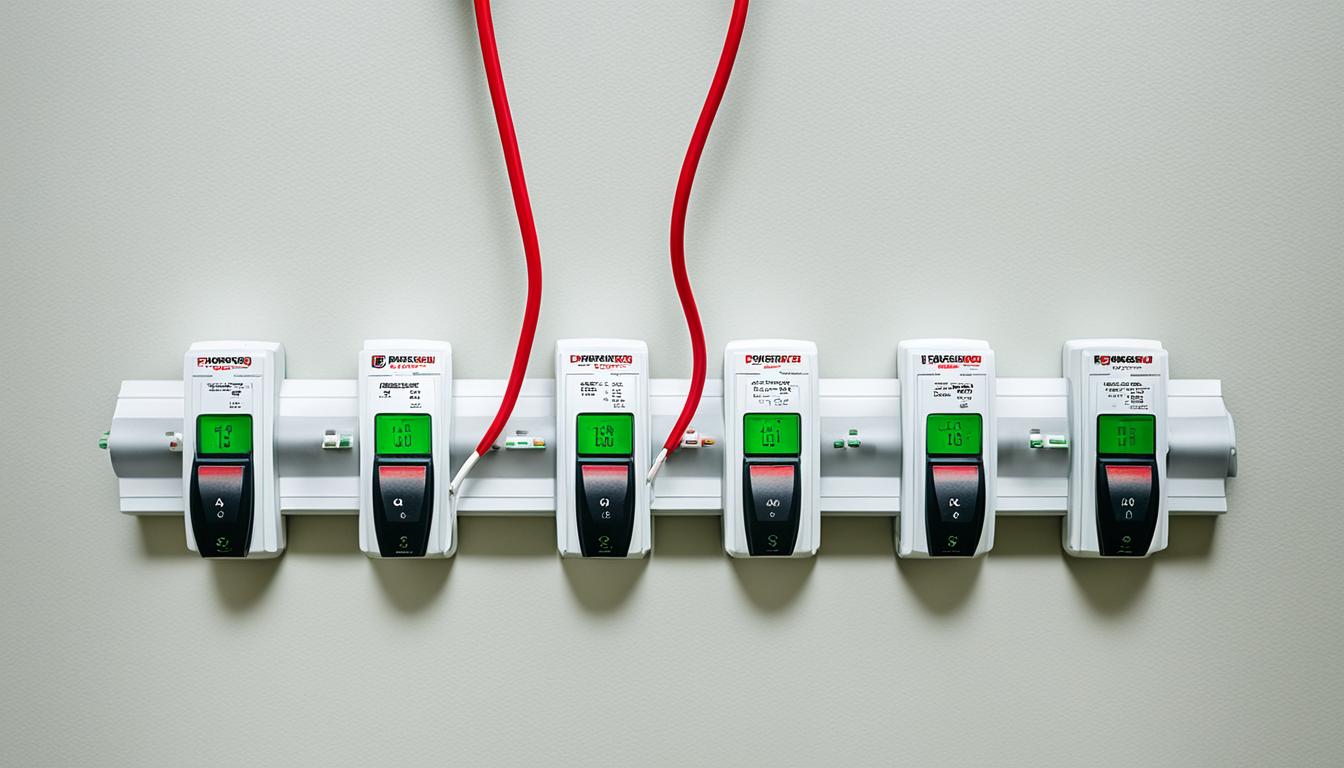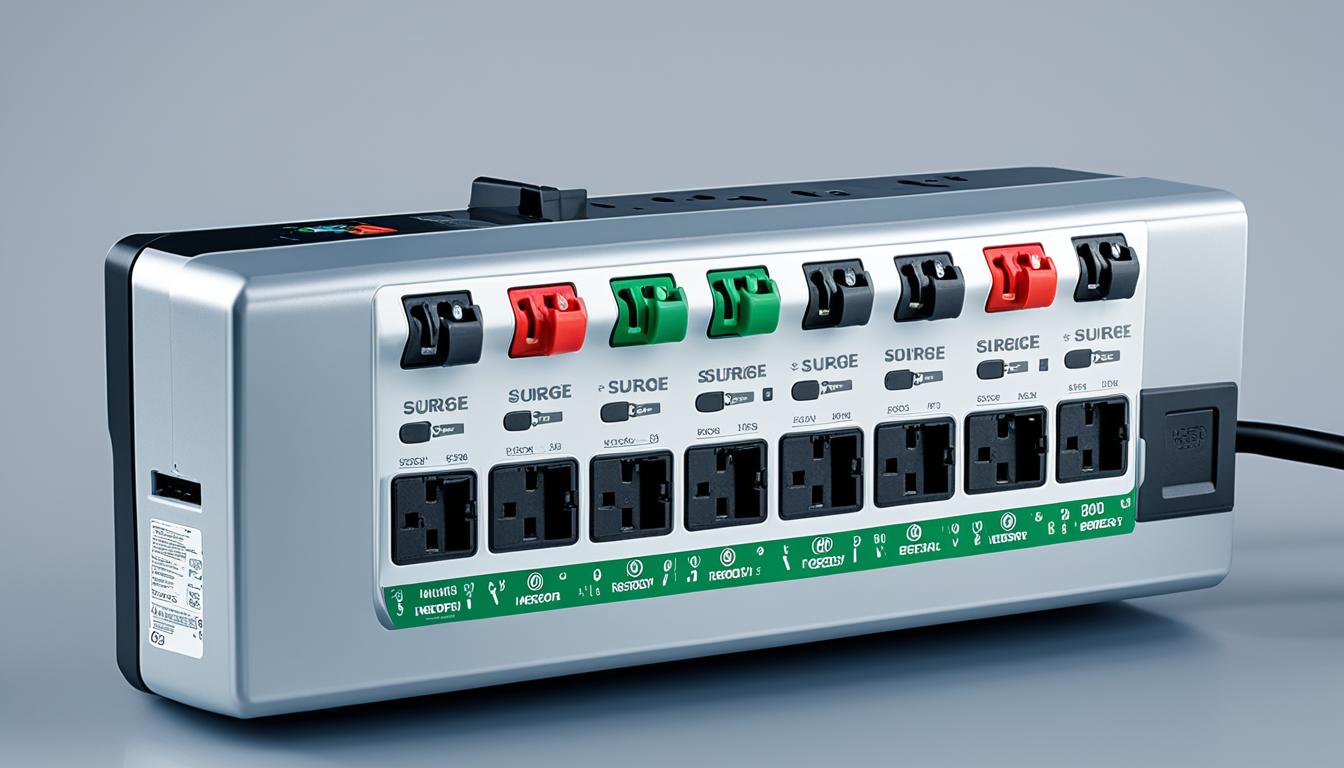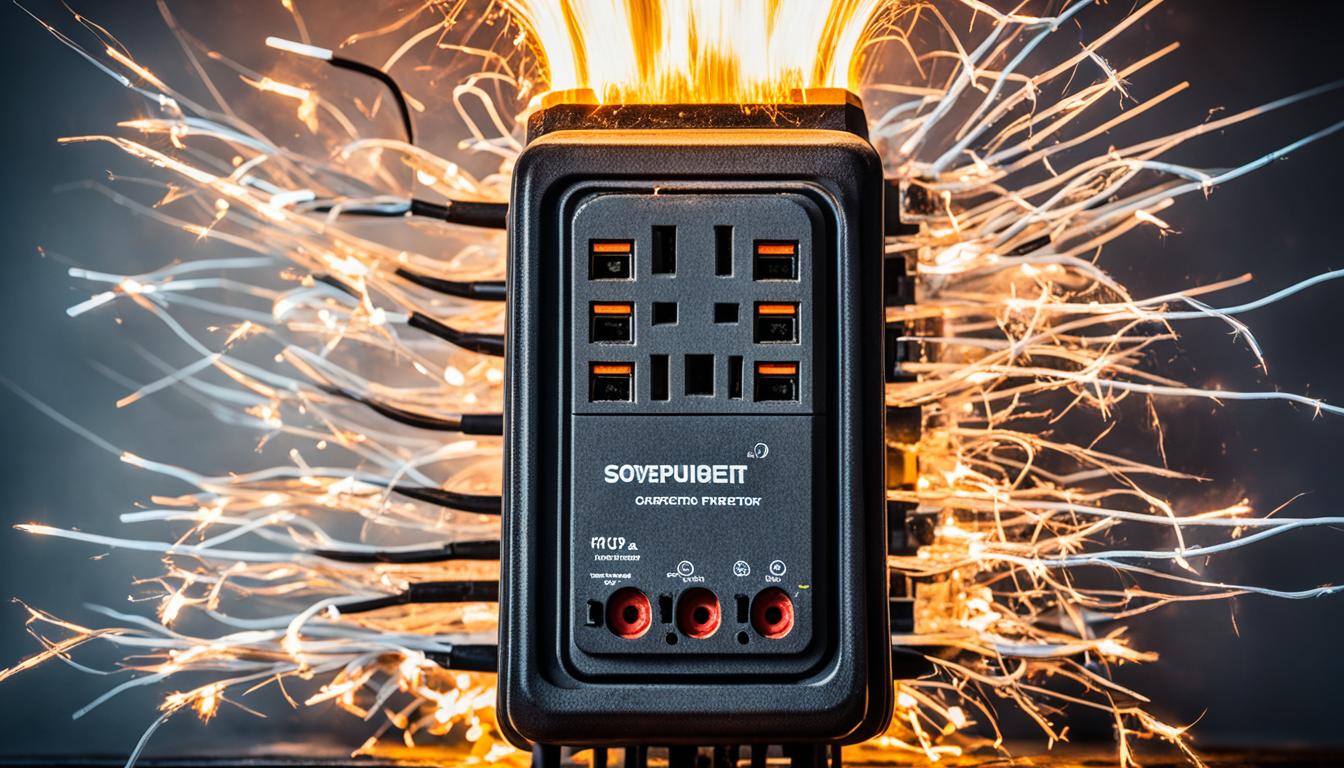extensioncords.site and its partners may earn a commission if you purchase a product through one of our links
Plugging a refrigerator into an extension cord may seem convenient, but it’s important to understand the risks involved and the best practices to ensure safety. Extension cords are not designed to handle the power requirements of refrigerators, which can lead to overheating and potential fire hazards. Voltage drop and overloading the circuit are additional concerns when using an extension cord for a refrigerator. Following best practices, such as direct outlet connection, adequate wiring, and using heavy-duty extension cords, can help maintain the optimal performance and safety of your refrigerator.
Key Takeaways:
- Using an extension cord to plug in a refrigerator can pose safety risks and potential fire hazards.
- Extension cords are not designed to handle the power requirements of refrigerators, leading to overheating and circuit overloading.
- Best practices include directly connecting the refrigerator to a properly grounded outlet and using heavy-duty extension cords if necessary.
- Regular maintenance and following manufacturer’s guidelines are important for safe refrigerator operation.
- Considerations when buying an extension cord for a refrigerator include length, gauge, and specific rating for appliance use.
Understanding the Risks of Plugging a Refrigerator into an Extension Cord
Plugging a refrigerator into an extension cord can pose significant risks to both your appliance and your safety. It’s important to be aware of these risks before considering this option. Let’s explore the potential problems:
1. Overheating and Potential Damage
The continuous power draw of a refrigerator can exceed the capacity of a standard extension cord. This can lead to overheating, which not only affects your refrigerator’s performance but can also cause long-term damage to the appliance itself. The risk of fire also increases with prolonged overheating.
2. Voltage Drop
The length of the extension cord plays a crucial role in maintaining the proper voltage supply to your refrigerator. If the extension cord is too long, it can result in voltage drop, which affects the refrigerator’s functionality and can shorten its lifespan. Additionally, using an extension cord with an insufficient gauge can exacerbate this issue.
3. Circuit Overloading and Fire Hazard
Plugging multiple appliances into the same extension cord increases the demand on the circuit. This can overload the electrical circuit, potentially creating a fire hazard. It’s important to consider the power load of all the devices connected to the extension cord to prevent overloading.
Given these risks, it is advisable to prioritize the safety of your refrigerator and avoid using an extension cord whenever possible. However, if using an extension cord is unavoidable, it’s essential to take precautions to mitigate the potential dangers. This involves using a heavy-duty extension cord specifically designed for appliances, considering the appropriate length and gauge.
Remember, the safety and longevity of your refrigerator are crucial, so it’s always best to refer to the manufacturer’s guidelines and consult with a professional electrician if you have any concerns.
| Risks | Potential Consequences |
|---|---|
| Overheating and Potential Damage | – Impaired performance – Long-term appliance damage – Increased fire hazard |
| Voltage Drop | – Decreased refrigerator functionality – Shortened appliance lifespan |
| Circuit Overloading and Fire Hazard | – Increased risk of electrical fires |
Best Practices for Powering Your Refrigerator
To ensure the safety and optimal performance of your refrigerator, it is recommended to follow best practices for powering it. Here are some guidelines to keep in mind:
- Direct Outlet Connection: Whenever possible, plug your refrigerator directly into a properly grounded outlet. This ensures a stable power supply and reduces the risk of electrical issues.
- Install New Outlet: If the outlet is far from the refrigerator, consider having a qualified electrician install a new outlet closer to the appliance. This eliminates the need for using extension cords.
- Choose a Heavy-Duty Extension Cord: In situations where using an extension cord is unavoidable, select a heavy-duty extension cord that is specifically designed for powering appliances. It should have the appropriate gauge and length to handle the power load of your refrigerator.
- Follow Manufacturer’s Guidelines: Always refer to the manufacturer’s instructions for your refrigerator. They may provide specific recommendations regarding power supply and extension cord usage.
- Perform Regular Maintenance: Regularly inspect and maintain your refrigerator to ensure safe and efficient operation. This includes checking for any frayed cords or loose connections.
By following these best practices, you can ensure that your refrigerator operates safely and efficiently, minimizing the risk of electrical issues or hazards. Remember to prioritize the safety of your appliances and consult a professional if you have any concerns.
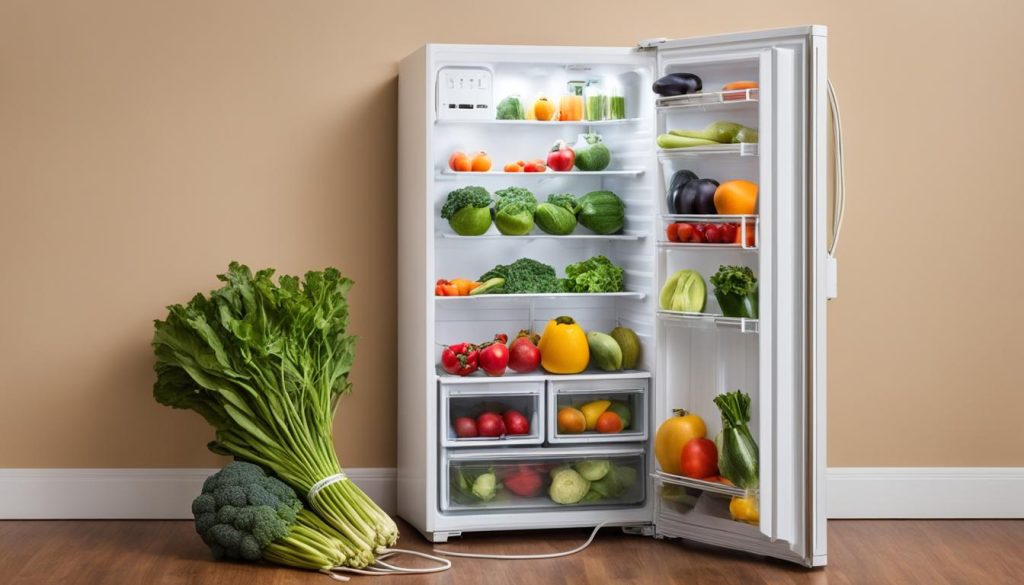
Why You Should Avoid Plugging a Refrigerator into an Extension Cord
When it comes to powering your refrigerator, it’s important to prioritize safety and avoid using an extension cord. While it may seem convenient, there are several reasons why this practice is not recommended.
Extension cords are not designed to handle the high power demands of refrigerators. Plugging your refrigerator into an extension cord can lead to overheating, which increases the risk of potential fire hazards.
Furthermore, extension cords are not intended for long-term use. Regularly using an extension cord with your refrigerator can cause the cords to wear out and potentially fail. This can be dangerous and leave you without a safe and reliable power source for your appliance.
Using an extension cord for your refrigerator can also create clutter and pose a tripping hazard in your home. It’s important to maintain a clean and safe living environment, especially in high-traffic areas.
Instead of relying on an extension cord, it is best to use a direct outlet connection for your refrigerator. If your outlet is far from the appliance, consider having a qualified electrician install a new outlet closer to the refrigerator. This will ensure a safe and reliable power supply without the risks associated with extension cords.
By prioritizing the safety of your refrigerator’s power source, you can avoid potential hazards and keep your appliance operating optimally.
Benefits of Direct Outlet Connection
When you connect your refrigerator directly to a properly grounded outlet, you’ll enjoy the following benefits:
- Reduced risk of overheating and fire hazards.
- Elimination of extension cord wear and potential failure.
- Avoidance of clutter and tripping hazards in your home.
Ensuring the safety of your refrigerator by using a direct outlet connection is a simple yet effective way to protect your appliance and maintain a safe living environment.
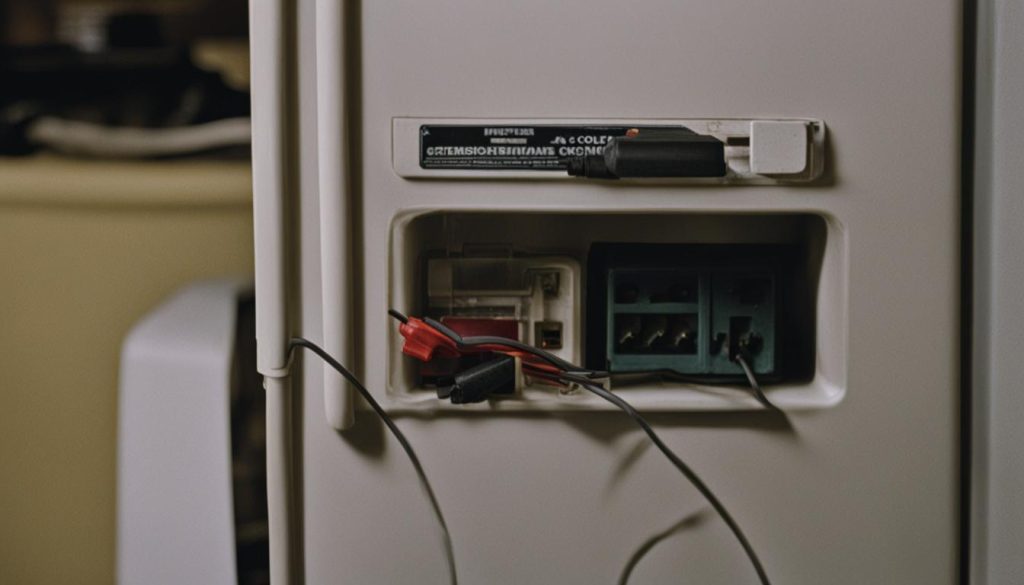
| Extension Cord Safety Checklist | |
|---|---|
| ✓ Do not use extension cords for high-power appliances like refrigerators. | |
| ✓ Use direct outlet connections whenever possible. | |
| ✓ Consider installing new outlets closer to your appliances. | |
| ✓ Avoid clutter and tripping hazards in your home. |
Considerations When Buying an Extension Cord for a Refrigerator
When purchasing an extension cord for your refrigerator, it’s essential to consider a few factors to ensure safety and optimal performance.
- Refrigerator Extension Cord Length: The cord should be long enough to reach from the outlet to the refrigerator comfortably. Additionally, it’s wise to have some extra length for flexibility if you need to move or clean around the appliance.
- Refrigerator Extension Cord Gauge: Checking the gauge of the extension cord is crucial as it determines the thickness of the wire. A higher gauge means a thicker cord, capable of handling more power. It’s recommended to opt for a thicker gauge extension cord to support the power requirements of your refrigerator.
- Refrigerator Compatibility: Ensure that the extension cord you choose is specifically rated for use with refrigerators. This rating ensures that the extension cord can safely handle the power load and voltage requirements of your appliance. Using a cord that is not designed for refrigerators can lead to overheating and potential hazards.
Taking these considerations into account when buying an extension cord will help you select the right one for your refrigerator, ensuring safe and efficient operation.
Conclusion – Prioritizing Safety When Powering Your Refrigerator
While it may be tempting to plug your refrigerator into an extension cord for convenience, prioritizing safety is crucial. Extension cords are not designed to handle the high-power demands of refrigerators, and using them can pose various risks, including fire hazards and appliance malfunctions.
Whenever possible, it is best to connect your refrigerator directly to a properly grounded outlet. If the outlet is far from your appliance, consider having a qualified electrician install a new outlet closer to where your refrigerator is located. This will ensure that your refrigerator receives the adequate power supply it needs without compromising safety.
Following the manufacturer’s guidelines for your refrigerator and performing regular maintenance are also important for its functionality and safety. In situations where using an extension cord is unavoidable, make sure to use a heavy-duty extension cord specifically designed for appliances. This will help mitigate the risks associated with using an extension cord for your refrigerator and maintain its optimal performance.
By prioritizing safety, following best practices, and using appropriate measures such as direct outlet connections and heavy-duty extension cords, you can ensure the longevity and safe operation of your refrigerator for years to come.
FAQ
Can I plug my refrigerator into an extension cord?
It is not recommended to plug a refrigerator into an extension cord due to the risk of overheating and potential fire hazards.
What are the risks of plugging a refrigerator into an extension cord?
Extension cords may not be able to handle the power requirements of a refrigerator, leading to overheating and potential damage. It can also cause voltage drop and overload the circuit.
What are the best practices for powering a refrigerator?
The best practice is to plug your refrigerator directly into a properly grounded outlet. If necessary, use a heavy-duty extension cord specifically designed for appliances.
Can you use an extension cord for a refrigerator?
While it is possible to use an extension cord for a refrigerator, it is not recommended due to the safety risks involved.
What should I consider when buying an extension cord for a refrigerator?
Consider the length and gauge of the extension cord. It should be long enough to reach the outlet and have the appropriate gauge to handle the refrigerator’s power load.
Should I prioritize safety over convenience when powering my refrigerator?
Yes, it is important to prioritize safety when powering your refrigerator. Avoid using extension cords whenever possible and follow manufacturer’s guidelines for optimal performance and safety.
